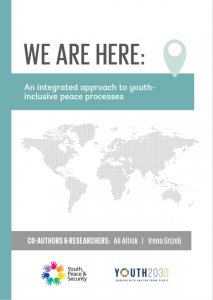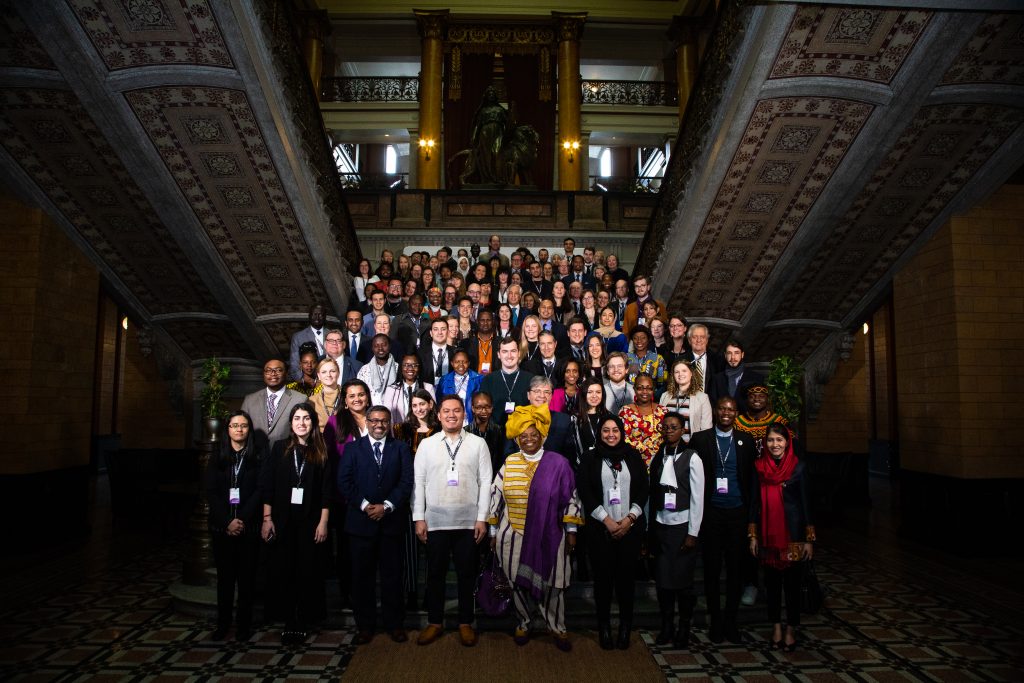 Hear, hear! A new policy paper on Youth, Peace and Security!
Hear, hear! A new policy paper on Youth, Peace and Security!
The United Nations Secretary-General’s Envoy on Youth, Ms Jayathma Wickramanayake, launched today – Wednesday 17 July 2019 – the policy paper “WE ARE HERE: An Integrated Approach to Youth-Inclusive Peace Processes” during a briefing of the United Nations’ Security-Council on Youth, Peace and Security. This paper explores the roles that young people can play in peacebuilding processes.
Across the world, young people are actively working to support peace processes, and are calling for a space in ongoing peace negotiations but continue to be unrepresented and excluded from decisions that will directly impact their present and future prospects for peace. More critically, in transitioning to a post-war state, young people from the foundations of a democratic and just society. Today, one in three internet users is a young person,[1] creating opportunities for people-led movements to significantly influence ongoing peacemaking efforts. This too increases the need for better coordination between actors across the board. This complex and dynamic landscape offers a broad range of strategic entry points for third-party mediation support groups to look for creative solutions in negotiating peace.
Against this backdrop, and after several years of advocacy by over 11,000 young people from over 110 countries, the United Nations Security Council unanimously adopted its first-ever resolution on Youth, Peace and Security (UNSCR 2250) on December 9th, 2015.[2] This important step places youth firmly on the peace and security/sustaining peace agenda, recognizing the role of youth in peacebuilding, and advocates for youth engagement and participation in peace processes. The UN Security Council Resolution 2419 (2018) further reaffirmed the need to fully implement 2250 and called on all relevant actors to consider ways for increasing the representation of young people when negotiating and implementing peace agreements. The Agenda 2030, and SDG 16 calls for the promotion of and support to peaceful, just and inclusive societies.
UNSCR 2250 (2015) and UNSCR 2419 (2018) make the clearest justification and urge member states to consider ways to increase the inclusive representation of youth in decision-making at all levels, including possible integrated mechanisms for youth to participate meaningfully in peace processes and dispute resolution. The Security Council recognized the critical need to engage young people not as a security threat, but as partners in key decision-making efforts including in political negotiations that have a direct impact on their lives today and in the future. The Resolution also mandates international bodies, including the United Nations, to partner with youth at a strategic level and to improve the coordination and interaction regarding the needs of youth in conflict situations.
To explore the roles that young people can play, based on research, politics, experiences of thought leaders and smart practice, and to understand what young people are currently doing to influence peace processes, the very first International Symposium focused on youth and peace processes was convened. The Symposium built and benefited from the past and ongoing work on the development process of the Progress Study on Youth, Peace and Security. The symposium was co-hosted by the Governments of Finland, the State of Qatar, and the Government of Colombia, and co-organized by the office of the United Nations Secretary-General’s Envoy on Youth (OSGEY) and Search For Common Ground (Search), in partnership with the United Nations Department of Political and Peacebuilding Affairs (DPPA), the United Nations Population Fund (UNFPA), the United Nations Development Programme (UNDP), and the United Network of Young Peacebuilders (UNOY). To learn more about the Symposium, please view the Summary Report HERE.
As part of the organization of the Symposium, two young researchers were contracted to research and develop the first global policy paper on youth participation in peace processes. The aim of the seminal paper was to document, assess and highlight where, how, and in what forms young people have participated in – and influenced – peace processes over the last 20 years. The paper set a foundation for the discussions and topics raised in the Symposium. The two independent researchers were Ali Altiok and Irena Grizelj, who spent the five months prior to the Symposium to design, research, develop and lead the drafting of the paper. The paper – ‘We are Here: An Integrated Approach to Youth-Inclusive Peace Processes’ – was shared with the Symposium participants a few days ahead of the Symposium as a key reading.
Click HERE to read the Policy Paper “WE ARE HERE: An Integrated Approach to Youth-Inclusive Peace Processes”.
Click HERE to access the Press Release.
Click HERE to access the Trello board including visuals and messaging on Youth, Peace and Security.
[1] UNICEF. The State of the World’s Children. 2017 Report.
[2] The United Nations Security Council Resolution 2250 states: “the term youth is defined […] as persons of the age of 18–29 years old, and further noting the variations of definition of the term that may exist on the national and international levels.”

